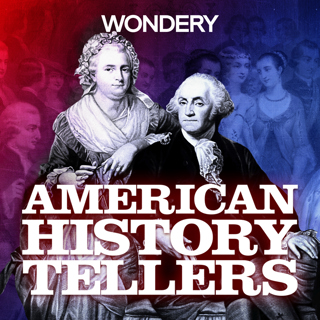
The Great Depression - Progress and Pushback | 5
After two of President Roosevelt’s closest advisors competed to create a new federal jobs program, the White House launched one of Roosevelt's keystone initiatives: the Works Progress Administration. Under this program, millions of Americans earned government salaries at a wide range of blue- and white-collar jobs — everything from building post offices and painting murals to delivering library books by horseback to rural communities.However, the federal government’s increased reach worried FDR’s opponents, especially a wildly popular Catholic radio preacher. Father Charles Coughlin once helped FDR get elected, but as the president’s power increased, Coughlin turned up the volume on hateful and anti-Semitic undertones in his attacks.Support us by supporting our sponsors!See Privacy Policy at https://art19.com/privacy and California Privacy Notice at https://art19.com/privacy#do-not-sell-my-info.
20 Mars 201938min

The Great Depression - Dust | 4
The Great Depression wasn’t the only crisis facing the country when Franklin Roosevelt took office in 1933. Following a decade-long drought that had shriveled crops, massive dust storms were pummeling huge swaths of the Midwest, the Great Plains, and the Northwest. Years of poor harvest practices had worsened the crisis, pushing farmers already strained by the financial hit of the Great Depression off their land. Only when a lifelong soil scientist made a dramatic testimony before Congress did the government finally begin to develop a solution.Many of those unmoored by environmental calamity searched for opportunity elsewhere — particularly in California. But when a controversial Los Angeles police chief sent armed officers to block access to the Golden State, he would launch a constitutional crisis and a showdown with a rural sheriff.Support us by supporting our sponsors!See Privacy Policy at https://art19.com/privacy and California Privacy Notice at https://art19.com/privacy#do-not-sell-my-info.
13 Mars 201940min

The Great Depression - A New Deal | 3
With the country was still hobbled by the Depression, New York Governor Franklin Delano Roosevelt promised a “New Deal” for the American people. That vow handed Roosevelt a contested Democratic nomination and helped him crush Hoover in the general election. Roosevelt began his presidency with a flurry of policy proposals and legislative efforts focused around three priorities: relief, recovery, and reform. These new efforts saw millions of young men put back to work preserving natural areas as part of the Civilian Conservation Corps and undertaking a massive rural electrification project in the Tennessee River Valley. And the country’s first female cabinet member led the creation of Social Security, one of the crowning achievements of Roosevelt’s administration.Meanwhile, a reckoning was in order for Wall Street. Years after the stock market crash, a raucous senate investigation would unveil egregious abuses by financiers.Support us by supporting our sponsors!See Privacy Policy at https://art19.com/privacy and California Privacy Notice at https://art19.com/privacy#do-not-sell-my-info.
6 Mars 201942min

The Great Depression - Brother, Can You Spare a Dime | 2
Factories have shut down, banks have failed, and millions are out of work. As the Depression worsens, public opinion sours toward President Hoover.Hoover’s allies attempt to counter criticism of the President by galvanizing anti-foreigner attitudes. They devise a scheme to frighten immigrants from Mexico and other countries with the specter of mass immigration raids in the hopes they’ll leave the country on their own, as hundreds of thousands do.Meanwhile, an unemployed cannery worker from Portland, Oregon leads tens of thousands of World War I veterans on a march to Washington, D.C., to demand payment of wartime bonuses. A deadly showdown looms as this “Bonus Army” wears out its welcome in the capital.Support us by supporting our sponsors!See Privacy Policy at https://art19.com/privacy and California Privacy Notice at https://art19.com/privacy#do-not-sell-my-info.
27 Feb 201938min

The Great Depression - The Crash | 1
The Roaring Twenties came to a screeching halt on October 29, 1929, with the collapse of the U.S. stock market. A year earlier, president Herbert Hoover had coasted to victory by promising the American people “a chicken for every pot” and “a car in every backyard.” Lured by the promise of skyrocketing markets, many first-time investors got caught up in margin trading, borrowing money to make bigger stock purchases than they could actually afford. It was a foolproof way to make money, so long as stock prices kept rising.But then, on the morning of Tuesday, October 29, more than sixteen million shares changed hands on the floor of the New York Stock Exchange. By the market’s close, investors had lost tens of billions of dollars — and kicked off a decade that would reshape American institutions, even as labor unrest, racial tensions, and the dark shadow of nativism pushed back from all sides.Support us by supporting our sponsors!See Privacy Policy at https://art19.com/privacy and California Privacy Notice at https://art19.com/privacy#do-not-sell-my-info.
20 Feb 201937min

Does History Repeat Itself? | 4
"Those who do not remember history are condemned to repeat it." On today’s show, we’ll consider what lessons we can draw from history, and what lessons we can’t. David Greenberg, a professor of history and media studies at Rutgers University, joins us to discuss how to connect the events of the past to the events of today. We’ll also talk about his latest book “Republic of Spin: An Inside History of the American Presidency,” which explores the history of political messaging inside the White House. Plus, Jesse James and this day in history.Support us by supporting our sponsors!See Privacy Policy at https://art19.com/privacy and California Privacy Notice at https://art19.com/privacy#do-not-sell-my-info.
13 Feb 201938min

The 1968 Chicago Protests - I Regret Nothing | 3
A special series with Legal Wars. The whole world was watching, and that’s exactly what the defendants wanted. As the end of 1969 approached, the Chicago 8 had become the Chicago 7. Bobby Seale, a Black Panther, had been removed from the trial in a brutal spectacle by Judge Julius Hoffman. The remaining defendants would respond by turning the courtroom upside down, much to the delight of the national media. Counterculture celebrities Allen Ginsberg and Norman Mailer would take the stand. And in the end, it was the establishment that would be put on trial.Check out Legal Wars for more stories behind America’s most famous courtroom battles.Support us by supporting our sponsors!See Privacy Policy at https://art19.com/privacy and California Privacy Notice at https://art19.com/privacy#do-not-sell-my-info.
6 Feb 201942min

The 1968 Chicago Protests - The Trial of the Chicago 8 | 2
A special series with Legal Wars. In 1969, the war in the streets became a war in the courtroom. The trial of the Chicago 8 pitted the federal government against eight prominent anti-war activists. The charges: Conspiracy to incite a riot. But the case was about more than just who threw the first punch at the DNC protests the year before. It was a battle for the soul of American culture, and both sides planned to win...by any means necessary.Check out Legal Wars for more stories behind America’s most famous courtroom battles.Support us by supporting our sponsors!See Privacy Policy at https://art19.com/privacy and California Privacy Notice at https://art19.com/privacy#do-not-sell-my-info.
30 Jan 201944min






















